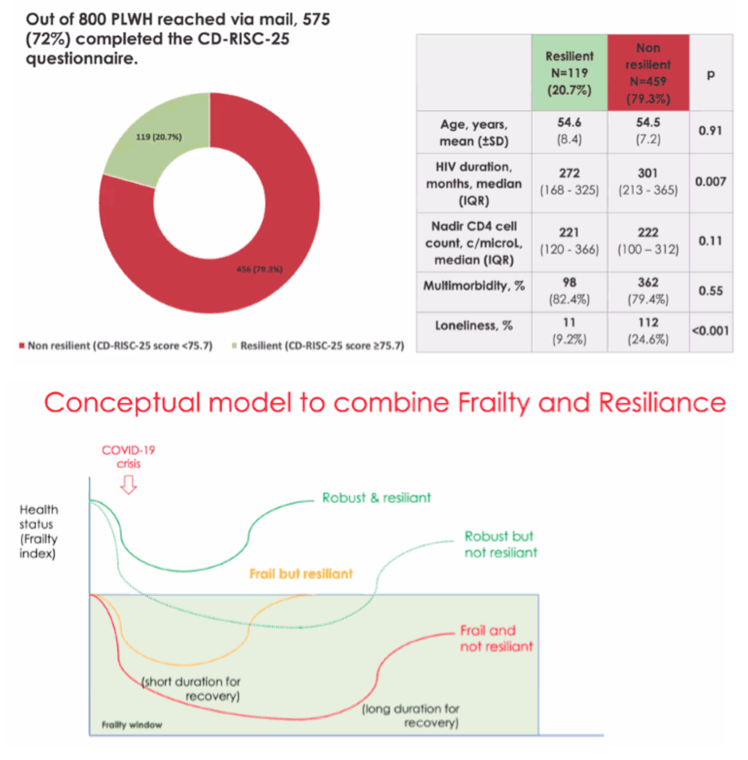| |
Impact of COVID on HIV & Aging in Era of ART
|
| |
| |
An Inter-CFAR virtual symposium
Healthy aging 80% Non Resilient Now During COVID / Isolation - Resilience and frailty in people living with HIV during the COVID era: two complementary constructs? - (02/09/21)
Presented Feb 9 2021 yesterday at CFAR Aging Workshop webinar by Giovanni Guaraldi
Reported by Jules Levin
Electronic questionnaires were provided to PLWH in Jan 2021 who attended MHMC at least once during 2019 to evaluate resilience, frailty, depression/anxiety & other symptoms. Average ages were 54-55 +/- 7 years. 79% were found to be non-resilient & 20% resilient. Loneliness & duration of having HIV were predictors of non-resilience. Being female was associated with non-resilience. From June 2020 through Jan 2021 resilience varied, some improved, some declined. 45% were frail (FI>/= 0.25). Nadir CD4, having multimorbidties, & duration of having HIV was associated with having frailty.
AUTHORS CONCLUDED:
• Resilience measures can characterize health status of PLWH during COVID.
• During COVID crisis stress prevalence of resilience decreases.
• Resilience measures + frailty measures can be complementary in evaluating quality of life & intrinsic capacity.
• Frailty & resilience should be evaluated in PLWH to identify vulnerable people who need interventions !!!!!
This study was conducted to see how COVID impacted vulnerable people: looked at the relationship between resilience & frailty in PLWH in Modena Italy HIV clinic. HIV duration > 20 years is a predictor (p=0.06) of impaired psychological resilience. Average age was 54-55 (+/- 7-8). Loneliness (p<0.001) was biggest predictor of impaired psychological resilience. Falls & family & social support were predictors of impaired psychological resilience. After multivariate regression analysis loneliness was the predictor (2.39 odds ratio). The others were not statistically significant. Having a longer duration of HIV was associated with being frail (45.9% were frail). HIV duration & loneliness were drivers of resilience. Nadir CD4 was driver of frailty (191vs 254). Multimorbidoty was associated with frailty. Diabetes & chronic kidney disease were most associated of the Comorbidities with frailty & non-resilience. See graph in report. This who were frail & non-resilient (37%) reported more often loneliness & longer duration with HIV & multimorbidities, and the worst energy & vitality, emotional well being, physical functioning, limitations due to physical health & the worst social functioning, and reported more often worse depression & anxiety. Non-resilient PLWH had worse quality of life.
RESULTS
79.3% were non-resilient. In table 1 just below you can see longer duration of having HIV was a predictor of non-resilience during COVID: non-resilient had average duration of 301 months vs resilient had average duration of 272 months with HIV.
Being FEMALE was a predictor of impaired psychological resilience, being >50 was a predictor of impaired psychological resilience.
Nadir CD4 <350 was associated with being a predictor of impaired psychological resilience but it was not statistically significant (p=0.07).
Loneliness is a predictor of scarce psychological resilience.
During COVID, study in Jan 2021 - from June 2020 until now some PLWH resilience got worse, some improved.

|
|
| |
| |
|
|
|